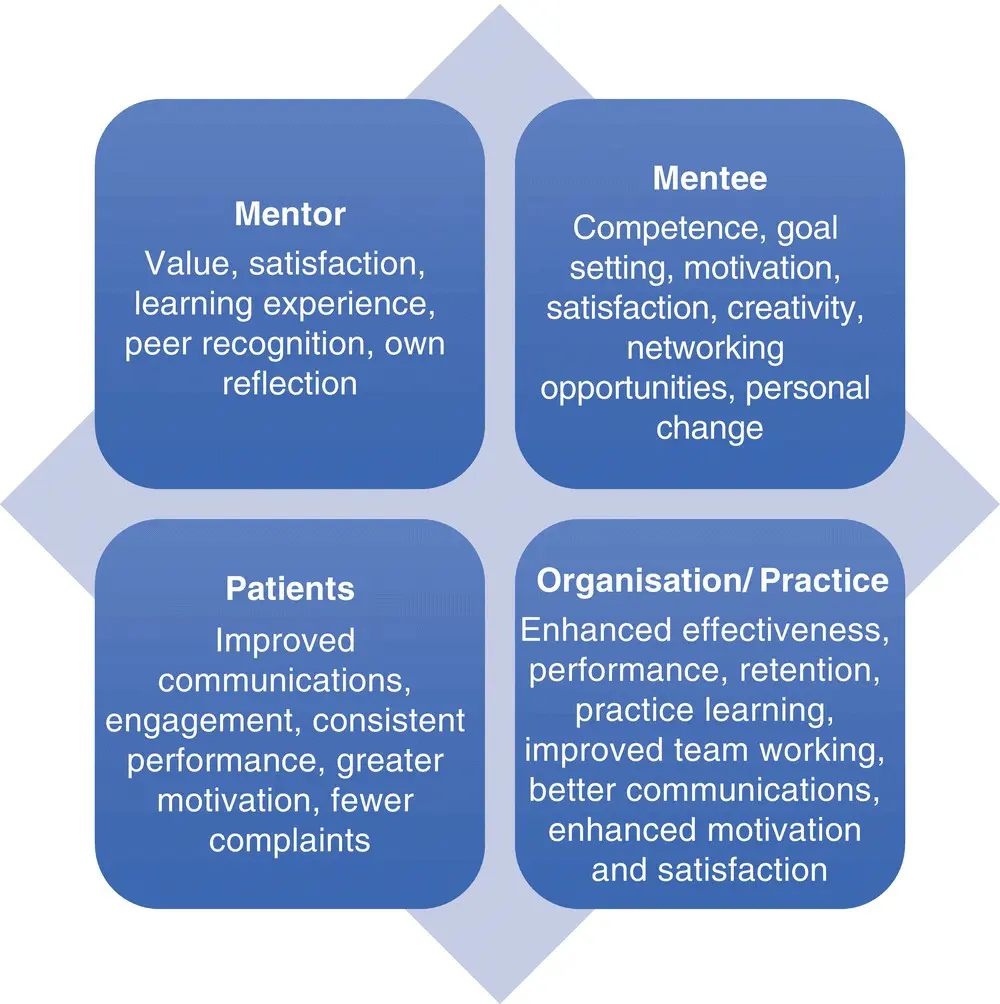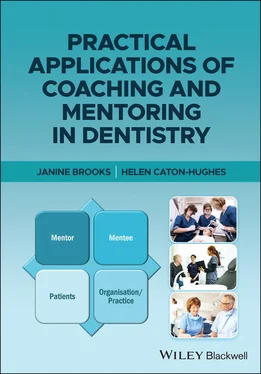
Figure 2.2 The impacts of mentoring.
Some advantages may at first sight appear intangible, yet they can all translate into financial benefits and a more sustaining working environment. Practices that promote mentoring typically have lower staff turnover. Dental professionals who are more fulfilled at work are more likely to perform at their best for more of the time. Patients will notice differences in communication and they are more likely to be better engaged with their own care.
Mentoring is a supportive conversation that will benefit individuals in:
Personal development planning
Career planning
Professionalism
Performance issues
General patient issues
Practice management
Business development.
Mentoring accelerates growth – by building confidence, sharing advice, opening trusted networks, and development based on the insight and experience of what works – transferring that wisdom from one person to another.
It's not just the mentee who benefits from supportive conversations: mentoring brings huge personal fulfilment for the mentor.
The relationship between mentor and mentee is one high on openness and low on bias and ego. The relationship is essentially inter‐developmental and the mentor should have no ‘agenda’.
Trust is placed in the middle because it forms the core of creating a productive environment where relationship, words, and intention can flourish. Trust acts as the glue that binds everything together.
It is crucial to build a productive and equitable mentor/mentee relationship. The power of any working relationship lies not just in the strengths each individual brings, but also on equal input from both sides.
While the mentor may be someone with more experience, with greater knowledge, or senior to the mentee, it is important to acknowledge the capacity and potential of the mentee, in order to build equity.
The Power Relationship in Mentoring
Mentoring is not typically a partnership of equals: managing the power relationship issue is important for success. Yet a high degree of trust, openness, and mutual regard is vital.
The power relationship between mentor and mentee should notbe too close. The mentor should notbe the mentee's line manager. A mentor who is more than two levels above the mentee constitutes too great a power distance in which the mentee may feel uncomfortable.
It's important to see the role of mentor as being just one half of what will be a powerful relationship, where the mentor is as likely to benefit and develop through the process as does the mentee.
An imbalance of power carries with it the potential for abuse of the relationship or exploitation. ‘Toxic mentoring’ is a term that describes using mentoring in a negative way where the mentee, and sometimes the mentor, can suffer detrimental effects.
Compatibility and Rapport
Compatibility between the needs of the mentee and experience of the mentor is important. Getting on ‘like a house on fire’ is not necessarily effective in the longer term. The mentor must match compatibility with an ability to address the mentee's needs.
Coming from a mind‐set of equal partnership can be effective in growing rapport.
When creating the mentoring ‘contract’ it's important to manage expectations, notably: the type of support and level of advice that a mentor is willing to give a mentee; the role(s) which the mentee expects the mentor to play.
When establishing personal and professional boundaries think about confirming the code of ethics and agreements that will underpin the partnership. Confirming the mentee's objectives and goals, will include: their current role; potential and future roles; networks and relationships; professional development requirements.
This will include age, gender, culture, and ethnicity issues. Questions of diversity may be important: for example, in the mentoring of women, people from black or minority ethnic communities, or where religious, cultural, or sexuality issues may be relevant (within the current Equalities legislative framework). Each partner in the mentoring relationship should feel comfortable and able to identify relevant dimensions and express preferences on these issues.
The relationship needs sustained commitment over time, from both parties, to be successful.
This includes geography and location, or different methods of contact such as face‐to‐face, telephone, email, virtual platform. It includes timing: how often mentor and mentee meet depends on how much time each are able to devote to mentoring, peoples' needs, and the mentoring objectives.
It is helpful to have mutual agreement on these points before the mentoring partnership begins.
Sanctions will also need to be thought about for example, what happens if the mentee fails to attend a meeting.
Avoid impossible matches, i.e. those which clearly would not work, for example working with your partner (either business or spouse). Avoid matching very similar people as it can be beneficial to match personality opposites. Opposites can get on very well and the ensuing dialogue is likely to be more stimulating and certainly more challenging! Some of the key skills of mentoring and coaching are receptive listening, adopting a non‐judgemental attitude and supporting the mentee by challenging their current thinking. These are not the domain of specific personality types, neither ‘strong’ or ‘introvert’ personality types; rather they are learned skills, honed by practise. What this means is that, as long as the mentor is well‐trained and suitably experienced, you don’t need to worry about matching ‘strong’ personalities to ensure that they get ‘enough challenge’. So‐called ‘quiet’ people can be challenging too! It's also unwise to assume that ‘strong’ personalities don’t need a sensitive approach or an empathetic listening ear.
The goal is to match people such that the mentee can express their hopes and fears to a receptive, non‐judgmental person who will give them the appropriate amount of guidance and enhance their self‐awareness, such that they take the right decisions for themselves, their professional development and their career direction.
Roles and Responsibilities
Managing expectations around roles and responsibility is also important. It will include setting clear expectations, such as that the mentee is responsible for creating their own results.
Starting, maintaining, and closing the relationship professionally will often depend on the needs of the mentee, their goals, and how quickly they wish to progress.
To be successful, expectations need to be matched with how much the mentor is able to give to the partnership. A mismatch can lead to failure.
Finally, the partnership duration and whether it is focused on specific goals or more related to ongoing professional and continuing development.
Matching Mentor and Mentee
Some organisations set up formal schemes for mentoring; others encourage informal matching methods. Networking and word of mouth can lead to successful mentoring relationships. Suggested matching criteria are given in the table below:
Table 2.1Matching criteria and the issues they raise.
Читать дальше













